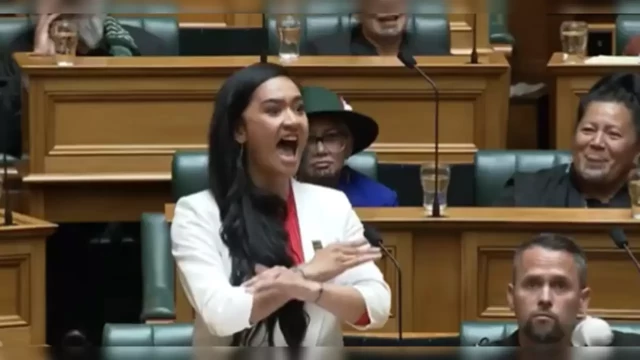New Zealand's youngest MP in 170 years delivers a compelling debut speech: "I'll sacrifice for you.
- Posted on January 5, 2024
- Politics
- By Arijit Dutta
- 548 Views
New Zealand's youngest MP, Hana-Rawhiti Maipi-Clarke, made a stirring maiden speech, passionately defending Māori rights in the wake of controversial government policies. Addressing indigenous issues, she vocalized concerns over recent decisions affecting Māori autonomy. Maipi-Clarke's emotional plea gained widespread attention and sparked protests against the government's approach to indigenous communities.
 Image Source -www.timesnownews.com
Image Source -www.timesnownews.com
Hana-Rawhiti
Maipi-Clarke, the youngest MP in New Zealand since 1853, captured public
attention with a poignant address in Parliament. Her inaugural speech,
delivered predominantly in her native Māori tongue, resonated across social
media platforms. Criticizing government policies, she passionately defended the
rights of indigenous communities, particularly the Māori, denouncing recent
decisions affecting their autonomy.
In
her compelling speech reported by the New Zealand Herald, Maipi-Clarke
dedicated her address to marginalized Māori children, urging them to embrace
their heritage and native language. She vehemently opposed the government's
actions, emphasizing their impact on critical aspects like healthcare,
environment, land, and language.
The MP's emotional 'war cry' resonated deeply, highlighting her commitment to safeguarding Māori interests both within and outside the Parliament walls. Maipi-Clarke's powerful statements echoed the concerns of indigenous communities, expressing fear that recent government decisions might unravel decades of progress and rights enshrined in the Treaty of Waitangi, or Te Tiriti o Waitangi.
Also Read: West Bengal's Governor, CV Ananda Bose, Denounces Assault On ED Officials As 'Ghastly'.
This
fervent speech follows a tumultuous period marked by the new coalition
government's decisions. Led by Christopher Luxon, the government announced
plans to review principles outlined in the Treaty of Waitangi, triggering
widespread protests and discontent among Māori leaders. The move to repeal or
revise policies pertaining to Māori rights, health initiatives, and language
use in public services sparked outrage within indigenous circles.
While
Prime Minister Luxon defended the decisions as efforts to ensure equality for
all New Zealanders, critics argued these steps could reverse decades of
progress in upholding indigenous rights. The resulting protests underscored the
growing rift between the government's stance and Māori communities' aspirations
for autonomy and equality.
The
conflict highlighted by Maipi-Clarke's speech reflects a broader societal
debate regarding the balance between indigenous rights and governmental
policies, prompting nationwide discussions and protests challenging the
government's approach to indigenous communities in New Zealand.




